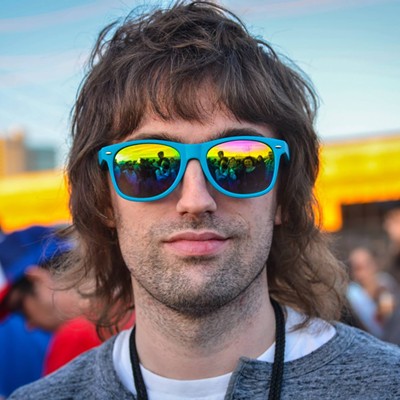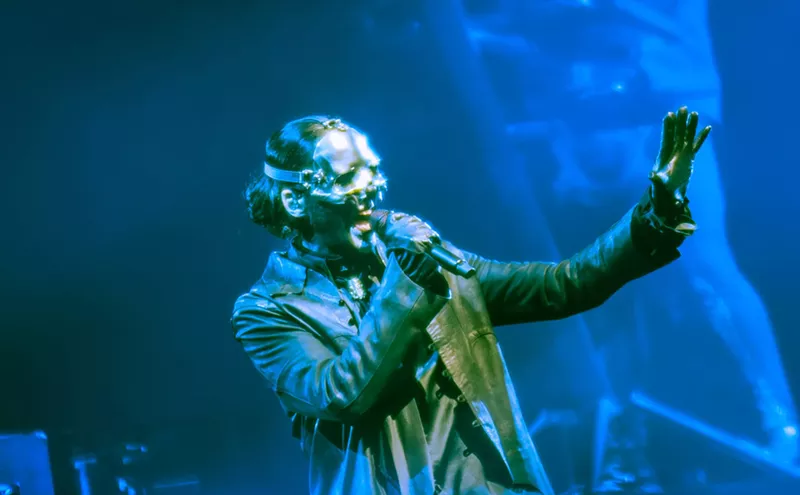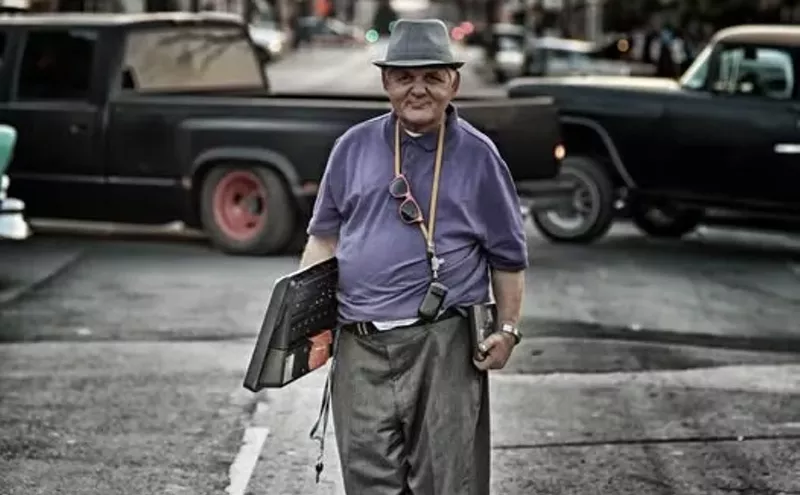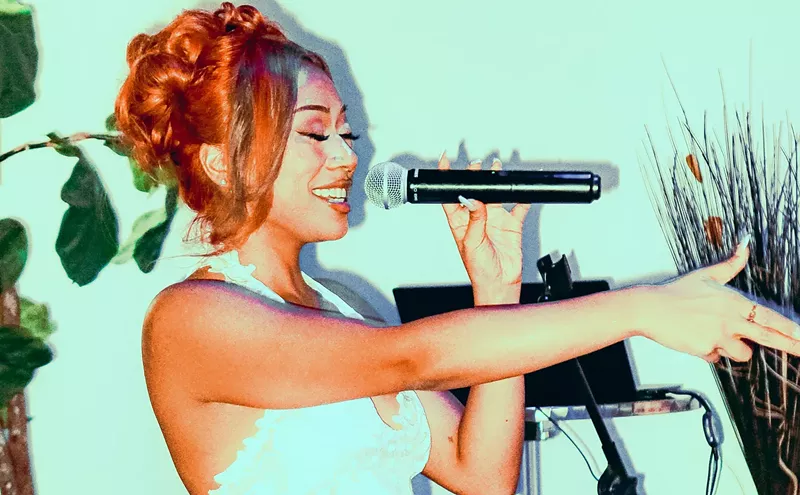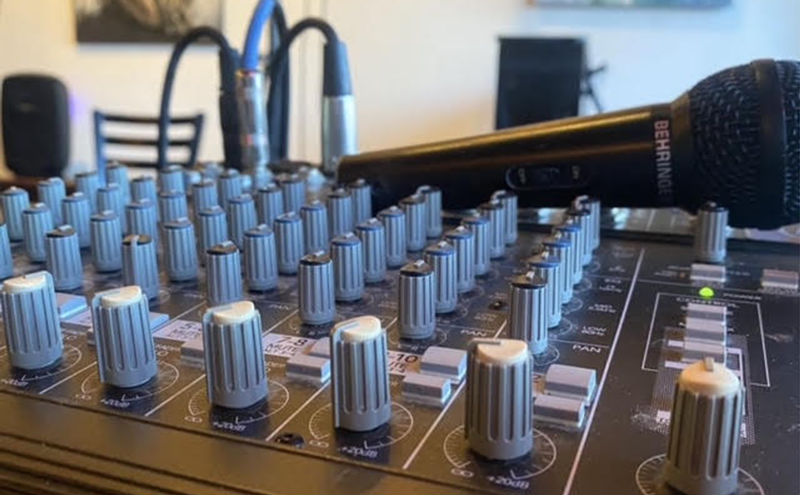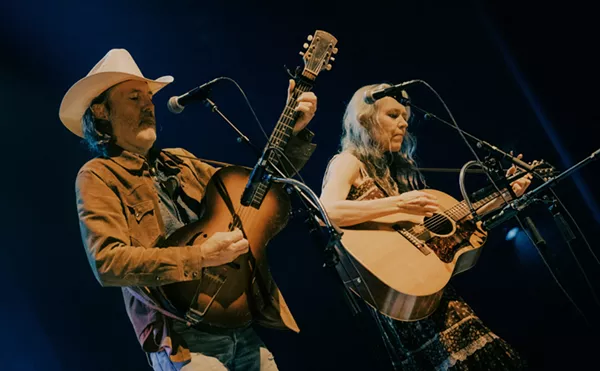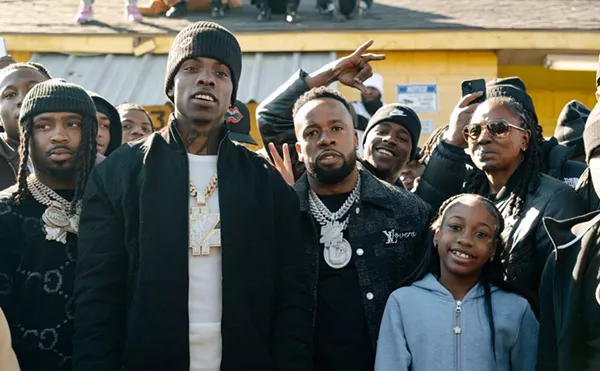On the surface, Dallas' music scene is the healthiest it's been in more than a decade. The rebirth that was taking hold in Deep Ellum in 2015 has seen storefront after storefront open for business in 2016. Next year will see the return of another long-lost venue, Deep Ellum Live, spearheaded once more by Clint and Whitney Barlow, the couple behind the rebirth of Trees and The Bomb Factory. When it reopens, the neighborhood will have nearly all of its classic venues back in operation.
However, it's not the Deep Ellum from years past, with the majority of those new businesses coming from restaurants and retail rather than music venues. Clubs have felt the pinch of increased property rates and one of them, the Liquid Lounge, preparing to at least temporarily close its doors this winter.
Venues may be booming, but where that leaves local musicians is another matter. After the Year of Leon Bridges in 2015, DFW didn't enjoy any repeats of his major national breakout this year. Instead, many emerging musicians felt like they had come under threat, thanks to a rash of DIY party shutdowns by the fire marshal that started on New Year's and continued throughout the year. Right or wrong, many musicians and artists are worried that they aren't a part of the city's long-term business plan. The DIY scene also lost two of its leading lights, as "roving venue" Vice Palace closed up shop and Nevada Hill passed away in February after a years-long battle with cancer.The Dallas Observer Music Awards ceremony takes place at The Bomb Factory on Tuesday, Dec. 6. Don't forget to vote!
tweet this
So on the eve of the 28th annual Dallas Observer Music Awards, which will see more than 50 local acts converge on nine different venues in Deep Ellum Saturday, Dec. 3, the Observer takes stock of the year past by checking in on some of the artists who helped define it: Sam Lao, Charley Crockett, Sealion, Loafers and Dezi 5.
SAM LAO: "We don't have to wait for gatekeepers or venues or anyone to give us the pass. We can take that shit for ourselves."
This year was the one that Sam Lao had been waiting for — she just wasn't sure that it ever would happen. It took her more than two years to follow up on her debut EP, West Pantego, and along the way she scrapped most of her recordings. Before that new album, SPCTRM, dropped in February, Lao broke with her manager and set off on her own. There were no guarantees that things would work out.
"One of my greatest strengths and weaknesses is that I'm too ambitious. I have these grandiose ideas but I don't always have a way to do them," Lao says. West Pantego had established her as one of Dallas hip-hop's most exciting talents, but she knew she had to do it all over again. "One of the fears I had was that the first time was a fluke, that with West Pantego somehow the pieces fell together perfectly and that would never happen again."
The truth proved to be anything but. SPCTRM is widely considered the best hip-hop album to come out of Dallas in 2016, and it garnered her five DOMA nominations — the most of any artist. The album puts Lao's varied talents on full display, from siren singer to best-in-town rapper. Songs like the middle-finger-to-the-haters opener, "Fool's Gold," or body empowerment manifesto "Pineapple" are smart, sassy and dripping with charisma. But most importantly, it gives modern Dallas hip-hop something it badly needed: a strong female role model.
"One of the questions I get most is, 'Who writes your music?' And I'm like, I write my music. What are you talking about?" Lao says. She points out that she not only writes the lyrics but has final say on all recording decisions. Even her music videos, done with her husband and visual artist Jeremy Biggers, are done collaboratively. "Any woman's success gets attributed to the closest man to her, which drives me bonkers," she says. "For someone to automatically assume I didn't do those things is kind of a slap in the face."
While being recognized simply as a "female artist" would do her work a disservice, Lao admits she took particular pleasure in asserting her femininity on SPCTRM. "I definitely wanted to put on display that not only am I a strong artist who can go head to head with anybody right now, but that I'm a woman doing it," she says, and then laughs. "If you don't like that, honestly, I'm going to go harder because I want you to feel like shit about it."
Being a rapper in Dallas has meant that Lao is already used to having to fight for credibility. When she was a member of the Brain Gang, a hip-hop collective that included other DOMA nominees like Blue, the Misfit and Bobby Sessions, venues often refused to book hip-hop. "As hip-hop artists, we all know we're kind of like the red-headed step child," she says. "We’re here, and people that are in our scene know about it, but people outside of it sort of brush us off."
That's changed in recent years, as local rappers are frequently capable of selling out bigger clubs like Trees. Lao says that's down to the rappers themselves taking charge. "I've seen more artists doing their own shows, not waiting to be asked to do a show," she says. "We don't have to wait for gatekeepers or venues or anyone to give us the pass. We can take that shit for ourselves and move forward."
If 2016 has proven anything to Lao, it's that taking matters into her own hands is the best guarantee she has to move forward. "Now, more than ever, is a time for strong women and strong individuals, and a time for us to stand together and speak out and be those voices," Lao says. "And I'm more than happy to take that up."
CHARLEY CROCKETT: "I'm doing great now that I'm actually getting paid."
Charley Crockett barely has time to take a breather, and that's just the way he likes it. Fresh off a 35-date tour with California singer Sean Hayes, Crockett is in town for a little over 48 hours, in which time he'll be playing two shows. Then he's off to California to play with Hayes again. He estimates he's played close to 200 shows in 2016.
"I like being run around," Crockett says. A self-styled drifter, he would likely spend his time on the road even if he weren't playing music. It just happens that he learned to play the blues by busking in New Orleans and on subway trains in New York City. "We were on trains all day every day, and if I wasn't on the trains I was doing that New Orleans hustle," he says. "That shit was hard. But I'm doing great now that I'm actually getting paid."
The hustle has been paying off for Crockett in 2016. He appeared on the cover of the Dallas Observer in September, got airplay on NPR's World Cafe and says he's in talks with record labels about picking up his latest album, In the Night — and all, he points out, without the help of an agent. He had a management deal once before, when he was in New York, but he walked away from it to go out on his own. "'Do you know what your problem is, Charley?'" he recalls being told. "'You just want to be Woody Guthrie.'"
Crockett took that as a compliment: Not only was Guthrie a rail-riding troubadour, he was a champion of the people. Born in San Benito in the Rio Grande Valley, Crockett grew up surrounded by people in poverty. "We were really poor, man. We lived in a rundown single-wide trailer," he says. Circumstances didn't improve much when his mother moved the family to Dallas: "A single woman without an education trying to climb up in the corporate world isn't easy. I felt [the poverty] here. Down there we were rural, it was different."
Today, Crockett has become an outspoken champion for Dallas' long-neglected blues history, shining a light on the legacy of artists like Blind Lemon Jefferson and T-Bone Walker whenever he gets the chance. But he developed his connection to the city's past almost by accident: He says that one time, while squatting in a friend's New York studio, he came across a song book of Walker's music and discovered many of the same chord progressions that he, a self-taught musician, had gravitated toward on his own.
"I started to identify more with Dallas because I was hearing it in me — the jazzier side of the blues, the R&B side," he says. He felt the same way about Tejano legend Freddy Fender, who was also born in San Benito, and Erykah Badu. "When I was younger, I didn't know about the blues. I knew about hip-hop. Hip-hop had that message that related to me and that drove me into the blues," he says. "It had that identifiable message of strength and overcoming obstacles and expressing suffering as a way to get through it."
While much of the blues' sociopolitical underpinnings have been scrubbed away by decades of white washing, Crockett sees the music as a tool for change — especially among a younger generation whom he believes hears it with a fresh perspective and shares his desire for sparser living. "I think it was Huey Newton who said, 'The man who owns nothing possesses all things,'" he says. "That whole American conditioning of 'go to school, get a job, get married, get a house and hoard' — I am completely against that."
Crockett pauses, considering his words for a moment. Then he adds, wryly, "It's not that I'm against it. I just can't hold that together."
SEALION: "Some bands live in beautiful parts of the country. But that's not Dallas."
Believe it or not, life isn't all fun and games for Sealion. The surf-punk quartet would land somewhere near the top of most any local music fan's list of the funnest bands in Dallas, and in the past few years they've become perennial vote-getters during DOMA season: Last year they were nominated in five categories, winning Best Punk Act honors, and they've repeated that nomination count this year. But as has been the case for many people around them, 2016 has not been an easy one for Sealion.
"I don't know, man, there's not a lot to be happy about right now," says singer and guitarist Hunter Moehring, with a shrug. He's not just referring to the fact that the band's longtime drummer, Alex Poulos, departed the group earlier this month.
"I always think music should be reflective in a way of our city, of our home. You get some bands who live in beautiful parts of the country and they can go out and surf all day and have a great time," he says. "But that's not Dallas."
Dallas is, instead, a landlocked city, a city of both great wealth and great poverty, and a city of stark racial segregation. Sealion's music may be high-energy, and Moehring may frequently find his way into moshing with his fans, but that doesn't mean the realities of his hometown don't weigh on him and his bandmates. "I think it's become more literal recently. Before, I would always try to cloak things the best I could to make them more ambiguous," he says. He points to one song, "Martians," from their last album, Heavy Fizz. "[That song] is about Socratic philosophy, but I thought it would be fun to write about aliens," he says.
Heavy Fizz is more than two years old now, but the fact that Sealion hasn't released any new music since isn't for a lack of trying: They recorded an EP in 2015 that still hasn't been released (they hope to put it out early in 2017), and have a full-length album's worth of music that they feel is ready to record. "It's a lot darker, it's a lot heavier. There's very little surf influence," Moehring says. In fact, the delay says a lot about the decisions that a mid-level band must make in order to get by: "Every time we seemed to have enough cash, we ended up going on the road," says guitarist Cole Denton.
A band like Sealion isn't prone to pass up any opportunity to hit the road. Playing live is the band's lifeblood. "It's kind of like with a heroin addict: He doesn't pick and choose when he wants to get high, he just wants to do it all the time," says Moehring.
"It's our favorite thing to do, so why would we not want to do that?" Denton agrees. "It's cathartic. It's the best way to get any negative energy out and to do it in a positive, constructive way," he says.
The band members' tastes stretch much further than punk rock; Denton comes from a hardcore and metal background, and singer and bassist Sam Villavert is a Janet Jackson-loving poptimist. ("[She's] here to reel us back and make us write a hook," says Moehring.) Last year, Sealion collaborated with rapper Blue, the Misfit on a Gorillaz cover, and Moehring played guitar on Blue's yet-to-be-released new album, A Perfect Night for a Funeral. But now, more than ever, the band appears to be embracing its punk roots.
"I think if you like punk rock, you like politics — or you dislike politics," says Moehring, who name checks Noam Chomsky and Howard Zinn. "As a young kid [who's into punk] you're like, 'Oh shit,' and you start paying attention more and learning more. I think it just never leaves you. It definitely never left me."
LOAFERS: "I didn't care what I had to do to be here, I just had to be here."
Loafers have only officially been a Dallas band for about two months, but they've loved every minute of it. You can't really blame them: For the four years prior, they were a band who lived in Waco. And as a result, they were a band who virtually had no home.
"There is no scene," says singer and guitarist Eric Eisenman, flatly, of his hometown. He says there was only one bar in town that booked bands, which Loafers played "a stupid amount of times," and that the rest of their time was spent on the road: going to Dallas, Fort Worth, Austin, San Antonio, even as far away as McAllen. "That's pretty much the Waco game. You got to be like, 'Fuck Waco, I'm going to play out of town,'" adds singer and guitarist Taylor Smith.
All four members of the band grew up in Waco (two of them attended Baylor), and as teenagers there were actually more options for live music. "Scenes have come and gone in Waco," Eisenman says. "Growing up around 7th grade there, in the early 2000s, I went to a lot of shows. A small little label [called Hero Records] tried to start putting on a lot of shows, then it literally just disappeared." Singer and bassist Savannah Loftin remembers hanging out at another venue, a metal club in the back of a tattoo parlor, but it closed too.
But from the very beginning, Loafers may have unknowingly been pushed toward Dallas: When the band's original bassist quit ("He was 'tired of the spotlight,' he told us," says Smith), they drafted in Loftin from another band called Ghost Babes and played their first show together at Bryan Street Tavern in East Dallas. "We kind of knew [the old bassist] was going to quit, so I was teaching her some songs on the down low," says Eisenman. "The four of us played a Ghost Babes show, and a week later played a Loafers show."
Over time, they became friends with several North Texas bands who passed through Waco, including War Party, Sealion and Party Static. They say it was Sealion's Hunter Moehring who ultimately lobbied them to relocate to Dallas rather than Austin. "Dallas was just more promising for us [than Austin]," says Loftin. "We played here so many times, driving back and forth. And basically all the bands we play with are from Dallas and Fort Worth."
Finally, when their lease was up last February, Smith and drummer Josh Wachtendorf moved to Dallas with "baby brother" band Teenage Sexx. "I was living in the living room just to be here. I didn't care what I had to do to be here, I just had to be here," says Wachtendorf. Eisenman and Loftin, however, "chickened out" and stayed behind until September. "We were still in Waco for six months and didn't have any fucking friends. It sucked," says Eisenman. "We were driving up from Waco to practice at least once a week."
Getting the band back together in one place (they all live in the same building, and practice in the same building as Sealion) has led to a flurry of activity, including writing songs for a new album. They've been welcomed in by the Dallas music community too, with nominations in five categories for this year's DOMAs.
"Everybody seems to know each other and support each other and go to each other's shows," says Loftin, marveling. "I don't know any other city that has this close-knit of a music scene."
DEZI 5: "Time to take it to another place and represent."
On election night, 2016, Dezi 5 found himself in a New York City karaoke bar. He and some friends had been bar hopping in Hell's Kitchen and made their way to Brooklyn to sing karaoke — a pastime that Dezi, the part-time singer of Dallas cover band Emerald City, was born to do. But no one sang karaoke that night. Instead, they were glued to the television and crying as the election results came in.
Dezi, however — a gay black man born in Oak Cliff who identifies as a Libertarian — refuses to let anything bring him down. "A lot of people tend to put things in the way of their happiness. I decided in my life, and maybe it's a bold or selfish decision, to put my happiness first," Dezi says. "I feel like we've persevered this long as a people, as humanity. You're the result of your own problems, so just treat people how you want to be treated."
Dezi, after all, was in New York on election night for a reason: He's planning to move there. The past two years have seen the R&B and pop showman spring from relative obscurity to being one of Dallas' most popular and outlandish performers; last year, for instance, he "crucified" himself at an art gallery, singing from on a cross. He often appears wearing leather and fishnets, and the past year he's gotten more ambitious, with costume changes and backup dancers. His ambitions may now have outgrown his hometown.
"I feel like we are the product of our surroundings. I've been visiting New York five times in the last year. I've seen this diversity and different people and just been going out," Dezi says. In particular, he's been finding producers who fit his R&B leanings, which he says are hard to find in Dallas. "I want to be able to make music for outside the city, outside the U.S. I want to look for cumbia music and just different sounds," he says.
Musicians threatening to move to a coast are as common as Donald Trump's accusations of voter fraud, but Dezi is one person who could pull it off. (He says he's moving in January.) A versatile singer with a powerful voice and a charismatic performer who commands most any room he walks into, he's just the kind of person to thrive in the city that never sleeps. "My music is definitely good, but I can sell it. I'm able to sell it," he boasts. "I've been going up and down and looking in the pubs [in New York]. Even in the cover band scene, there's nobody like me."
Leaving Dallas was bound to happen one way or another. If it wasn't New York, it would be Los Angeles — or Las Vegas. "It's a show town, and that's what I'm all about is the show," Dezi says, of Vegas. "My uncle always used to say, back in the day, he could see me headlining a show in Vegas. All the greats headline shows in Vegas." While Dezi admits that a big appeal of the "show" is the glitz and glamor, he says it's also a matter of preparation: "I used to think of it that way, like, 'I'm going to go to Prophet Bar and Erykah Badu is going to walk in there and she's going to see me at the jam session and I'm going to be famous,'" he says.
These days, Dezi leaves nothing to chance, but he figures that Dallas gave him all the preparation he needs to take on the world. "I've been trained here, in a good way. I've been molded," Dezi says. "We are real [in Dallas]. We have a certain — not a style, because Dallas has so many styles — but uniqueness that comes with it. The hunger, the passion."
Dezi clasps his hands together and nods his head with an air of finality. "Now it's time for me to take that out and see what I can do," he says. "Time to take it to another place and represent."
Vote for this year's Dallas Observer Music Awards nominees at 2016musicawardspoll.dallasobserver.com.


